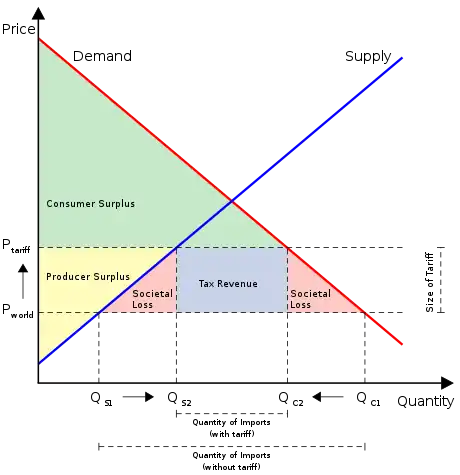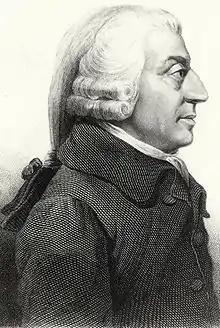Economic liberalism
Economic liberalism is a political and economic philosophy based on strong support for a market economy and private property in the means of production. Although economic liberals can also be supportive of government regulation to a certain degree, they tend to oppose government intervention in the free market when it inhibits free trade and open competition. Economic liberalism has been described as representing the economic expression of liberalism.
| Part of the Politics series on |
| Neoliberalism |
|---|
 |
|
| Part of a series on |
| Liberalism |
|---|
 |
|
| Part of a series on |
| Capitalism |
|---|
|
As an economic system, economic liberalism is organized on individual lines, meaning that the greatest possible number of economic decisions are made by individuals or households rather than by collective institutions or organizations.[1] An economy that is managed according to these precepts may be described as liberal capitalism or liberal economy.
Economic liberalism is associated with free markets and private ownership of capital assets. Historically, economic liberalism arose in response to mercantilism and feudalism. Today, economic liberalism is also considered opposed to non-capitalist economic orders such as socialism and planned economies.[2] It also contrasts with protectionism because of its support for free trade and open markets.
Economic liberals commonly adhere to a political and economic philosophy which advocates a restrained fiscal policy and the balancing of budgets, through measures such as low taxes, reduced government spending and minimized government debt.[3] Free trade, deregulation of the economy, lower taxes, privatization, labour market flexibility, opposition to trade unions[4] and indifference towards economic inequality[5][6][7][8][9][10] are often hallmarks of economic liberalism.[3] Economic liberalism follows the same philosophical approach as classical liberalism and fiscal conservatism.[11]
Origins

Arguments in favor of economic liberalism were advanced during the Enlightenment, opposing mercantilism and feudalism. It was first analyzed by Adam Smith in An Inquiry into the Nature and Causes of the Wealth of Nations (1776) which advocated minimal interference of government in a market economy, although it did not necessarily oppose the state's provision of basic public goods.[12] In Smith's view, if everyone is left to his own economic devices instead of being controlled by the state, the result would be a harmonious and more equal society of ever-increasing prosperity.[1] This underpinned the move towards a capitalist economic system in the late 18th century and the subsequent demise of the mercantilist system.
Private property and individual contracts form the basis of economic liberalism.[13] The early theory was based on the assumption that the economic actions of individuals are largely based on self-interest (invisible hand) and that allowing them to act without any restrictions will produce the best results for everyone (spontaneous order), provided that at least minimum standards of public information and justice exist. For example, no one should be allowed to coerce, steal, or commit fraud and there is freedom of speech and press.
Initially, the economic liberals had to contend with the supporters of feudal privileges for the wealthy, aristocratic traditions and the rights of kings to run national economies in their own personal interests. By the end of the 19th century and the beginning of the 20th, these were largely defeated. Today, economic liberalism is associated with classical liberalism, neoliberalism, right-libertarianism and some schools of conservatism such as liberal conservatism.
Position on state interventionism
Economic liberalism opposes government intervention on the grounds that the state often serves dominant business interests, distorting the market to their favor and thus leading to inefficient outcomes.[14] Ordoliberalism and various schools of social liberalism based on classical liberalism include a broader role for the state, but they do not seek to replace private enterprise and the free market with public enterprise and economic planning.[15][16] A social market economy is a largely free market economy based on a free price system and private property, but it is supportive of government activity to promote competitive markets and social welfare programs to address social inequalities that result from market outcomes.[15][16]
Historian Kathleen G. Donohue argues that classical liberalism in the United States during the 19th century had distinctive characteristics as opposed to Britain:
[A]t the center of classical liberal theory [in Europe] was the idea of laissez-faire. To the vast majority of American classical liberals, however, laissez-faire did not mean no government intervention at all. On the contrary, they were more than willing to see government provide tariffs, railroad subsidies, and internal improvements, all of which benefited producers. What they condemned was intervention in behalf of consumers.[17]
See also
References
- Adams 2001, p. 20.
- Brown, Wendy (2005). Edgework: Critical Essays on Knowledge And Politics. Princeton University Press. p. 39.
- Simmons, Beth A.; Dobbin, Frank; Garrett, Geoffrey (October 2006). "Introduction: The International Diffusion of Liberalism". International Organization. 60 (4): 781–810. doi:10.1017/S0020818306060267. ISSN 1531-5088.
- Boudreaux, Don (2015-03-31). "Milton Friedman on the Real World Effects of Labor Unions". Cafe Hayek. Retrieved 2020-10-13.
- "Why Tackling Global Economic Inequality Is Liberal Democracy's Next Big Challenge". www.worldpoliticsreview.com. Retrieved 2020-10-15.
- Letters (2016-12-28). "Liberal values and the growth of inequality | Letters". the Guardian. Retrieved 2020-10-15.
- Green, Jeffrey Edward (2017-11-01). "Has Inequality Led to a Crisis for Liberalism?". Current History. 116 (793): 320–323. doi:10.1525/curh.2017.116.793.320. ISSN 0011-3530.
- "Liberalism and the New Inequality". The Breakthrough Institute. Retrieved 2020-10-15.
- "Why liberals are way, way too obsessed with income inequality". American Enterprise Institute - AEI. 2013-03-26. Retrieved 2020-10-15.
- September 13, Ed Conard; Edt, 2016 9:00 Am. "What Liberals Don't Understand About Income Inequality". Time. Retrieved 2020-10-15.
- Gamble, Andrew (29 August 2013). "Neo-Liberalism and Fiscal Conservatism". In Thatcher, Mark; Schmidt, Vivien A. (eds.). Resilient Liberalism in Europe's Political Economy. Cambridge University Press. pp. 53–77. ISBN 978-1-107-04153-0.
- Aaron, Eric (2003). What's Right?. Dural, Australia: Rosenberg Publishing. p. 75.
- Butler 2015, p. 10.
- Turner 2008, p. 60-61.
- Turner 2008, pp. 83–84.
- Balaam & Dillman 2015, p. 48.
- Donohue, Kathleen G. (2005). Freedom from Want: American Liberalism and the Idea of the Consumer. Johns Hopkins University Press. p. 2. ISBN 9780801883910.
Bibliography
- Adams, Ian (2001). Political Ideology Today. Manchester University Press. ISBN 978-0-719-06020-5.
- Balaam, David N; Dillman, Bradford (2015). Introduction to International Political Economy. Routledge. ISBN 978-1-317-34730-9.
- Butler, Eamonn (2015). Classical Liberalism – A Primer. Do Sustainability. ISBN 978-0-255-36708-0.
- Turner, Rachel S. (2008). Neo-Liberal Ideology: History, Concepts and Policies. Edinburgh University Press. ISBN 978-0-748-68868-5.
